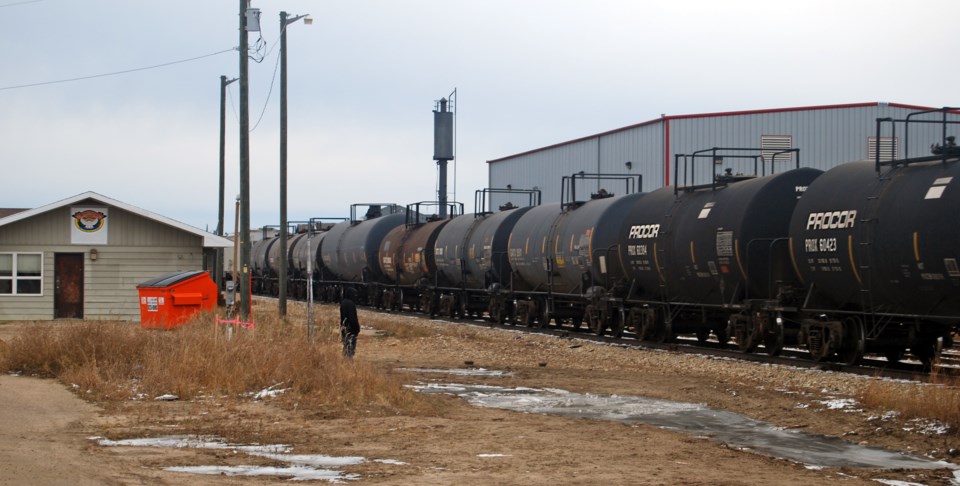For Lac La Biche County’ s deputy mayor, dangerous goods moving along the rail line through this community are an inescapable reality.
For Lac La Biche County’ s deputy mayor, dangerous goods moving along the rail line through this community are an inescapable reality.
That’ s not to say councillor John Nowak is ignoring the hazardous freight that rolls through the county, passing through the centre of Lac La Biche and the ward he was elected to represent. Instead, he sees the situation as something that can’ t be changed, only adapted to.
“Ultimately, we’ re going to see dangerous goods shipped by rail. There’ s really no way we can get around that,” he said. “We’ ve got the rail line in our backyard, and we need to make sure our emergency responders are ready to handle any incidents.”
The POST contacted Nowak after the provincial Wildrose Party issued a news release that hinted more crude oil shipped by rail is likely if Alberta’ s NDP government doesn’ t push forward in building new pipelines.
The release references a report by the Fraser Institute, which compares the safety of pipelines to rail transportation for oil and gas.
“Specifically, rail is found to be over 4.5 times more likely to experience an occurrence when compared to pipelines,” the think-tank’ s report reads.
The document explains that pipelines experience more “incidents” than trains do in an average year, but pipelines also carry much more product.
The Wildrose Party sent its news release days after the rejection of the Keystone XL pipeline, a mega-project to carry oil from Alberta to the Gulf of Mexico. Without that pipeline, exporters are left with limited options, the Wildrose says.
“The premier and her fellow opponents of Keystone XL have to realize that their actions result in more oil by rail,” Leela Aheer, the opposition party’ s shadow energy minister, said in a statement. “If the NDP really care about safety, the environment and Alberta’ s prosperity, they will quit trying to play both sides and devote themselves to getting pipelines built as soon as possible.”
The Wildrose MLA for the Lac La Biche-St. Paul-Two Hills constituency, David Hanson, says his party agrees with the Fraser Institute’ s findings in favour of pipeline safety.
“Our position is that pipelines are the safest way to move oil,” Hanson told the POST. “There seems to be a lot more derailments affecting lakes and rivers than pipelines.”
Rail safety has leaped to the forefront in recent years, after a train carrying crude oil derailed and exploded in Lac-MĂ©gantic, Quebec in July of 2013.
The topic is also frequently discussed locally, because the railway passing through Lac La Biche County on its way to the Fort McMurray area is the only rail line in northeastern Alberta, ensuring it carries a significant amount of industrial shipments.
In February of this year, four oil-bearing train cars left the tracks near Conklin. Details about the incident were slow to emerge, but CN officials said at the time that there were no injuries and no loss of product.
If there’ s anything the provincial government can do to improve rail transportation monitoring, then that would be worth looking into, Hanson told the POST, adding that the onus needs to be on CN to ensure their rail line and trains are operating safely.
The POST also contacted Premier Rachel Notley’ s office for comment, advising that rail safety is an important topic for both Lac La Biche County residents and local officials.
The POST received a response, but from the Minister of Energy rather than the premier. In a series of statements, Minister Margaret McCuaig-Boyd told the newspaper the NDP government intends to build new pipelines but it needs to improve Alberta’ s environmental record. None of her statements mentioned rail safety or were specific to communities like Lac La Biche that are directly affected by industrial rail traffic.
“The opposition is in denial that we need to do anything different,” the minister said. “Their plan would see our province continue down the same failed path that has emboldened pipeline opponents, alienated jurisdictions we need to have on our side, and prevented pipelines to tidewater from being built. We reject the failed conservative approach to building pipelines. Our approach is different.”
Whether crude oil is traveling by rail or by pipeline, Deputy Mayor Nowak says there are other things Alberta, and Canada overall, could do differently.
“What we need to do as a country is create new markets,” he said. “We also need to start building more refineries closer to home. We can be more than just people who drill holes and ship oil.”
For now, though, tank cars roll through Lac La Biche County on a daily basis-and while CN only discloses the cars’ contents to certain qualified individuals for business confidentiality reasons, Nowak says anyone can see for themselves that hazardous materials are going by.
“We all see the industrial goods that pass through,” he said. “We have discussed this issue with CN. Things can happen, so as a municipality we need to work closely with CN.”
County officials have been trying to arrange a meeting with CN representatives for the past several months, to talk about safety and the possibility of building another rail crossing in downtown Lac La Biche, but without success so far. Nowak hopes the meeting can take place soon.
“It’ d be nice to have a meeting with them before the end of the year because we have been waiting a while for this,” he said.
According to CN, responsibility in handling hazardous materials is a cornerstone of the transportation giant’ s operations.
“When dangerous goods shipments account for approximately 10 per cent of your total traffic volume-like they do for CN-there’ s no room for even the slightest mistake. Not even an inch. Not with many lives hanging in the balance,” CN’ s official website reads.
